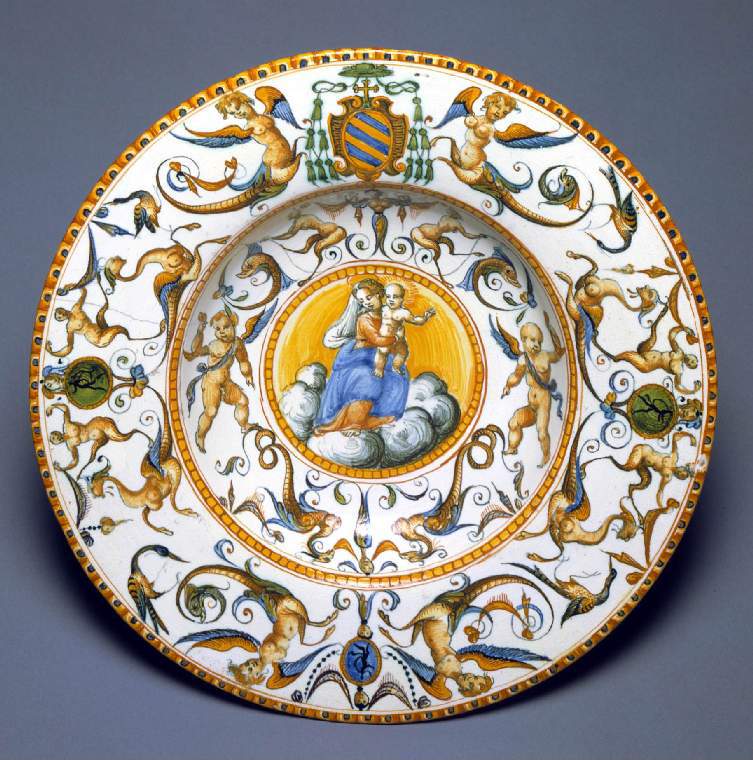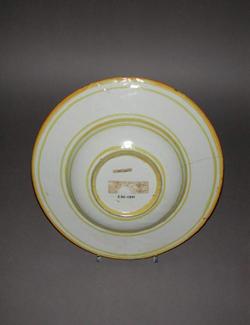Current Location: Gallery 27 (Glaisher)
Maker(s)
Production:
Patanazzi family
(Probably)
Entities
Categories
Description
Maiolica dish with broad rim. Painted in polychrome with, in the middle the Madonna and infant Christ, surrounded on the side of the well and the rim by a shield, putti, grotesques, and cameos.
Pale buff earthenware, tin-glazed creamy-white overall. Painted in blue, green, yellow, orange, manganese-purple, black, white, and grey. Shape 59 with wider rim. Circular with broad, sloping rim and wide, deep well, standing on a footring.
In the middle, encircled by simulated beading, the Madonna sits on a bank of clouds with the infant Christ standing on her knee. On the side of the well are two putti separated by grotesques and above, a band of yellow and orange simulated beading. The rim is decorated with grotesques and cameos interrupted at the top by a cartouche containing an oval shield charged with the arms bendy or and azure, ensigned by a cross and a green hat, and flanked by three rows of green tassels. The yellow edge is decorated with orange, brown and white petals. The back is encircled by yellow bands: two on the footring, one outside it, three at the shoulder, and two by the edge.
Notes
History note: Probably Girolamo Talpa (1654-1739),San Severino (Marche); sold by him to Cardinal Filippo Antonio Gualtieri (1660-1728), Orvieto and Rome. Andrew Fountaine IV; his heir; Christie's, 17 June 1884, Catalogue of the celebrated Fountaine collection of majolika, Henry II ware, Palissy ware, Nevers ware, Limoges enamels . . ., removed from Narford Hall, Norfolk, lot 198; M. Colnaghi. Stephenson Clarke (1824-91); Louis C.G. Clarke, LL.D., (1881 -1960), Leckhampton, Cambridge.
Legal notes
L.C.G. Clarke Bequest, 1960
Measurements and weight
Diameter: 33.4 cm
Height: 5.6 cm
Acquisition and important dates
Method of acquisition: Bequeathed
(1961-04-27)
by
Clarke, Louis Colville Gray
Dating
16th Century, Late
17th Century, Early
Renaissance
Production date:
circa
AD 1600
Note
Symmetrical grotesque decoration painted on a white ground was fashionable on maiolica services during the late sixteenth and early seventeenth century. Initially it was used for the borders of istoriato scenes, and by the last decade of the century often occupied much of the surfaces of dishes and other vessels. This dish belonged to an armorial service of which at least nine other pieces are extant. Four circular dishes have a Saint in the middle and the arms on the rim above: St Paul, in the Walters Art Museum, Baltimore (48.1516); St Thomas, formerly in the Bak collection; St Mark formerly in the Pringsheim and Hannaford collections; and St John, formerly in the Ridout collection. A fifth with the arms in the well was sold anonymously by Sotheby's in 1980 and is now in the Gardiner Museum, Toronto (G83.1.405). Four oval dishes decorated respectively with a figure representing Spring, Summer, Autumn, and Winters, are in the Museo d'Arti Applicate, Milan (inv. nos. 234, 240, 239 and 236). The service was probably made around 1600 because the style of its grotesque decoration is close to a dish in the Louvre, Paris, bearing the arms of Cardinal Paolo Emilio Zacchia (Cardinal 1598-1605), and attributed to the Patanazzi workshop in Urbino. The best-known family who bore the arms on this dish - bendy or and azure - was the Contarini of Venice. Possible members of the family who were either an archbishop or a bishop, indicated by the green hat and cross above the arms, were Tommaso Contarini who was Archbishop of Crete (1597-1605), or a less notable cleric, Gerolamo Contarini who was Bishop of Capo d'Istria (1600-20).
The dish is historically interesting because its ownership can be traced back to 1712 when it was sold with the dishes mentioned above by Girolamo Talpa (1654-1739) of San Severino (Marche) to Cardinal Filippo Antonio Gualtieri (1660-1728). Five, including the Fitzwilliam's were later in the collection of Sir Andrew Fountaine of Narford Hall, Norfolk, and were sold by Christie, Manson & Woods in 1884.
School or Style
Renaissance
People, subjects and objects depicted
Components of the work
Decoration
composed of
high-temperature colours
( blue, green, yellow, orange, manganese-purple, black, white, and grey)
Materials used in production
Tin-glaze
Earthenware
Techniques used in production
Tin-glazing
: Pale buff earthenware, tin-glazed creamy-white overall. Painted in blue, green, yellow, orange, manganese-purple, black, white, and grey.
Inscription or legends present
- Text: af 13
- Location: On back
- Method of creation: Incised
- Type: Collector's mark
Inscription present: rectangular paper label
- Text: Lot 198/-Fountaine Collection/Urbino dish. The/Contarini arms./surmounted by Cardinals/hat.
- Location: On back
- Method of creation: Inscribed in faded black ink
- Type: Label
Inscription present: small rectangular paper label
- Text: Croydon Lodge
- Location: On back
- Method of creation: Inscribed
- Type: Label
References and bibliographic entries
-
Catalogue of the celebrated Fountaine collection of majolika, Henry II ware, Palissy ware, Nevers ware, Limoges enamels, carvings in ivory, hone stone and rock crystal, Greek and Roman coins, ancient armour &c. &c., removed from Narford Hall, Norfolk
-
The Fountaine collection of maiolica
page(s): p. 445
-
Italian Maiolica and Incised Slipware in the Fitzwilliam Museum Cambridge
page(s): pp. 403-05
-
Fitzwilliam Museum Handbooks, Italian Maiolica
page(s): 98-9
-
The Identification of Maiolica from Sanseverino
page(s): 97
-
Una famiglia di ceramisti urbinati: i Patanazzi
page(s): 105-15
-
Catalogue of the Italian Majolica in the Walters Art Gallery
page(s): 35
-
Milan, Museo d'Arti Applicate, Le ceramiche, Tomo primo
page(s): 232-5
Related exhibitions
Identification numbers
Accession number: C.90-1961
Primary reference Number: 76333
Stable URI
Audit data
Created: Saturday 6 August 2011
Updated: Thursday 5 September 2024
Last processed: Tuesday 2 September 2025
Associated departments & institutions
Owner or interested party:
The Fitzwilliam Museum
Associated department:
Applied Arts





